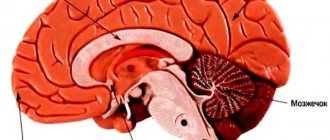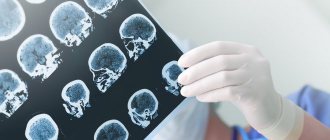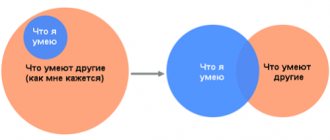Speech disorders in adults
So, my grandmother. A very independent 86 year old man. She has lived alone for many years and manages the housework herself. He actively communicates with his friends and takes part in all public events in the area. We are used to seeing her strong, energetic and respected by everyone.
Voice from the Well
One day I called her, as usual, to inquire about her well-being, her affairs, to hear about the next council of veterans and preparations for the May Day demonstration. But I heard a strange dull voice, sluggish and slow. To all my questions about her health, she answered that nothing hurt, but her speech was slow and quiet - as if I were talking to a person sitting at the bottom of a well. I asked how she slept. It turned out that she had trouble falling asleep the night before, so she decided to take sleeping pills. I sighed with relief, deciding that such lethargy was due to the influence of sleeping pills, and went about my business.
The next day the story repeated itself. Only depression was added to the slow speech: “I won’t live to see summer,” etc. I thought it would be right to cheer up my grandmother, give her an incentive - my son is finishing school in the summer, there will be graduation - I definitely have to survive.
And again she did nothing. How I scold myself now for this!
When nothing changed on the third day, I ran to my grandmother’s house. She is pale, lethargic, lies all the time, does not eat anything. I called an ambulance. They arrived and within 2 minutes after they entered the apartment, I heard the word “stroke”.
Clear signs of a stroke
· The doctor simply asked the grandmother to stick out her tongue - the tongue deviated to the side.
· He asked me to raise both hands up - one rose, and the other immediately fell down.
· I asked her to tell me her date of birth, but she didn’t remember.
· I ran the tip of a pencil over one hand and the other - it turned out that one hand did not feel anything (exactly the one that the grandmother could not lift).
Such simple signs. Of course, I could have checked it myself, suspected it and raised the alarm earlier...if I had known. I imagined a stroke as a real blow: a person is standing, walking, and suddenly falls on the spot. He loses consciousness and is taken to the hospital where he is diagnosed with a stroke. It turns out that it happens differently.
My grandmother was diagnosed with an ischemic stroke of the brain, which, it turns out, can actually develop gradually. But, as the doctor later explained to me, it is very important to start treatment measures as early as possible. The earlier treatment begins, the less likely there are irreversible changes. Brain cells do not die immediately; they can still be saved for some time, as well as protect neighboring cells from destruction and stop the spread of the pathological process. This is what treatment in the hospital is aimed at.
First, the grandmother was admitted to intensive care, where she stayed for a day. During this time, the condition worsened. When she was transferred from the intensive care unit to the neurological department, my grandmother could not speak or get up, and yet she left the house “on her own two feet.” The doctor asked not to be alarmed and said that this is the normal course of this pathology. And then the treatment began, which lasted 3 weeks. During this time, my grandmother began to speak and walk again, but she flatly refused to work with a speech therapist and did not want to train her arm. And she continued to be very lethargic, sleeping all the time.
The day of discharge arrived. The attending doctor said that everything that they could do in the hospital was done. Now we are moving into the rehabilitation period, and now everything depends on how the grandmother will work to restore lost functions. Of course, they prescribed all sorts of medications, but my grandmother’s indifference and apathy continued to bother me.
Houses and walls heal
But at home, everything changed in a few days. We figured out how to make classes interesting.
He doesn’t want to work with a speech therapist, we’ll sing songs. They started playing her favorite songs, she sang with pleasure, and her speech began to noticeably improve.
She doesn’t want to do exercises for her arm, so they came up with something for her to do: write memoirs. Given a laptop, he sits, typing text. Willy-nilly, the fingers work. Soon I was able to hold a cup and use cutlery.
And most importantly, my mood has improved. Girlfriends come and talk about similar incidents in the life of the Veterans Council. It turns out that many of those around them suffered a stroke. Some recovered better, others worse.
I look at my grandmother and rejoice at her every success: she went out for a walk and baked pies herself. But the feeling of guilt never leaves me alone - if I had realized in time that trouble had happened, perhaps my grandmother’s condition would have been much better. You need to be more attentive to your loved ones!
Causes
To avoid problems with speech, many organs and systems of the body must be normal, including muscles and nerves.
The most common causes of such violations are:
- vocal cord paralysis;
- respiratory and colds;
- nodes, polyps and tumors in the area of the vocal cords and on them;
- stroke;
- injuries and other brain problems;
- damage to the vocal cords;
- muscle weakness.
Diseases that also contribute to such problems include:
- amyotrophic lateral sclerosis;
- autism;
- Huntington's disease;
- dementia;
- ADHD, or attention deficit hyperactivity disorder;
- cancer of organs involved in the formation of sounds.
Agnosia and apraxia
For example, a patient cannot determine by touch with one hand, with his eyes closed, that in front of him is a key or a box of matches. He understands the individual characteristics of an object (lightness, rustle, parallelepiped) for a box, and cold, heaviness, smoothness, long shape for a key. But he can only understand what it is by looking at them.
It is the diagnosis and treatment of subtle disorders of higher cortical functions that is the “aerobatics” in neurology, since MRI and CT will not help here - we are talking about functional disorders.
Symptoms of speech disorders
Signs of speech impairment may vary depending on the type of problem. Most often this is:
- unintentional drawling;
- roughness, hoarseness or squeaky voice;
- constant stops during a conversation;
- repetition of syllables and sounds, sometimes entire parts of words;
- visible difficulty speaking;
- frequent inclusions of extraneous words and sounds in speech;
- jerking your head or blinking frequently during a conversation.
Symptoms of high frequency hearing loss
Most frequently encountered difficulties:
- inability to hear speech clearly in silence and in background noise;
- difficult to talk on the phone;
- difficulty watching television programs and films even when the volume is increased;
- incomprehensibility in understanding high-pitched women's and children's voices;
- inability to listen to your favorite music, as its sound is distorted;
- feeling tired from having to constantly listen.
By limiting communication, a person can upset relatives, friends, and colleagues, as they will perceive this as a reluctance to communicate. In the family, misunderstandings with the spouse and accusations of selective hearing may arise. In turn, the hearing-impaired person accuses others of speaking unintelligibly and quietly.
Awkward moments are also created when a person does not hear correctly, answers out of place, does not react to jokes, or does not catch the thread of the story. Sometimes he, not understanding what was said, only nods and smiles, expressing his participation in the general conversation. Uncompensated hearing loss can negatively affect your career, relationships, personal life...
Fight hearing loss
If you have a diagnosed hearing loss, hearing aids can help amplify essential high-frequency sounds without amplifying low-frequency sounds. From the very beginning of wearing hearing aids, you will begin to better understand speech addressed to you and be able to hear forgotten sounds, such as the sound of rain, birdsong, the rustle of dry leaves, the sound of a microwave oven, or the phone ringing.
Remember that there are a lot of people who can hear speech but do not understand it. This is the most common complaint of patients when visiting hearing specialists, so they are more familiar with this problem than anyone else and are able to solve it, taking into account the individual characteristics of each person. You shouldn’t deny yourself communication with your family, colleagues and friends, just consult an audiologist or hearing care specialist. You can do this right now.
Peripheral cranial nerve palsies
It is known that muscle weakness occurs with peripheral paralysis. Most often, disorders of phonation, swallowing and speech articulation occur with bulbar syndrome. This is a lesion of the caudal group of peripheral nerves - hypoglossal, vagus, accessory and glossopharyngeal. Bulbar progressive syndrome can be life-threatening due to respiratory and circulatory problems.
About dysphonia and dysphagia
Signs of bulbar syndrome are dysphonia, dysphagia and dysarthria. What it is?
Dysphonia is a disorder of phonation and weakness of the voice. Occurs with paresis of the recurrent laryngeal nerve, which moves the vocal cords. With paresis of one ligament, a person can be completely heard, but his voice is hoarse and weak;
Dysphagia is weakness of the pharyngeal constrictor muscles. It is they who ensure swallowing, and the passage of food further, from the pharynx into the esophagus, the lumps enter unconsciously, switching to vegetative impulses.
Dysphagia is manifested by choking and difficulty swallowing. With mild dysphagia, it is difficult to swallow solid food, and with severe dysphagia, even water is very difficult to drink, the person chokes, and water pours out through the nose. The soft palate is paralyzed, and food may enter the lungs, causing aspiration pneumonia. A transfer to tube feeding is required.
What is dysarthria?
Dysarthria often occurs as an age-related phenomenon with general involution (reverse development) of the higher functions of the central nervous system.
Dysarthria. This is difficulty in speaking. Dysarthria should not be confused with aphasia; with dysarthria, the cerebral cortex understands and produces speech correctly, but the muscles of the oral cavity, masticatory muscles, and tongue, being weakened, cannot correctly say the right words. Dysarthria is manifested by nasal voice, nasal tone (nasal tone), as well as slurred pronunciation of phrases.
Everyone remembers the jokes about the late Brezhnev, when the phrase “tits, tits, tits, shit” meant nothing more than “systematically socialist countries.” This is a perfect example of mild dysarthria.
Difficulty understanding speech in noise
With high-frequency hearing loss, difficulties arise in understanding speech even in silence, and when there is background noise or several people are talking at the same time, it is extremely difficult to perceive the meaning of speech. Many people who have not been treated for hearing loss for several years develop complexes; they try not to visit busy places, various events, or remain silent because they cannot fully communicate with other people.
The most common classification of speech disorders
In this case, we will talk about the most common classification of aphasia on the territory of modern Russia, named after its founder A. R. Luria. It is more convenient to present this classification in the form of a table below:
| Type of aphasia | Its description |
| Broca's aphasia | This pathology can also be called efferent motor aphasia. A condition that usually occurs after a stroke lesion of the lower parts of the cerebral cortex in the left hemisphere in right-handed patients, in other words, when the focus of brain tissue damage is localized in Broca’s motor-speech center. This pathology causes a significant breakdown of the grammar of speech utterances and is characterized by a telegraphic style of the patient’s utterances with difficulties quickly switching thoughts from one syllable (or even word) to another. In this case, the patient may experience literal paraphasia, when the victim after a stroke unconsciously replaces some sounds with others, which leads to severe impairments in reading, pronunciation and writing |
| Dynamic pathology | The problem is manifested by the impossibility of constructing some kind of internal program for statements and their implementation. This form develops after damage to the prefrontal areas in the left hemisphere during a stroke (again in right-handed victims) |
| Afferent motor | It can develop after stroke pathology when the lesion of brain tissue is localized in the posterior central, as well as in the parietal cortical regions. The pathology is characterized by violations of the sound selection links. Victims cannot distinguish sounds that are close in articulation |
| Sensory or Wernicke's aphasia | This pathology after a stroke is based on disorders of phonemic auditory function, when the patient does not distinguish the sound composition of words |
| Acoustic-amnestic | With this stroke pathology, there is a decrease in the volume of retention of the simplest auditory-verbal information, with inhibition of auditory-verbal memory |
| Amnestic | The problem occurs when a stroke affects the parietotemporal regions of the brain. The defect manifests itself in difficulties in naming familiar objects, while maintaining an understanding of their functions and purpose. |
| Nominal pathology | This pathology that occurs during a stroke is very close to the previously described amnestic aphasia and may be one of the harbingers of complications of a stroke with Alzheimer's disease |
| Semantic | It is based on some defects in simultaneous analysis and synthesis of speech, when a patient who has suffered a stroke is not able to simultaneously grasp a large amount of information. The leading defect for this form of aphasia is manifested in the inability to understand complex logical-grammatical sentences or constructions that describe spatial relationships |
However, it should be noted that within the framework of a more simplified classification, doctors try to distinguish: only motor aphasia - a condition when a patient who has suffered a stroke has lost speech, while the understanding of other people’s oral statements is intact, and sensory aphasia, when a patient with stroke pathology is not able to understand what they are saying other people, with preserved ability to independently pronounce words and even phrases.
Methods for treating speech problems
If speech disorders do not cause significant discomfort in a person, do not put pressure on him psychologically and do not interfere with normal life in society, then they do not require treatment, and in some cases they may go away on their own after some time. Much less often you have to resort to the help of a doctor, who determines treatment depending on the severity and causes of the problem.
In these cases, the doctor resorts to individual lessons and training designed to help the person develop smooth, correct speech and relieve him of the problem. The course is selected in each specific case.










